How long do Mercedes tires last is a question many owners ask, since these premium tires come with an expensive price tag. This comprehensive guide will examine the key factors impacting Mercedes tire lifespan so you can learn how to maximize their durability. With proper maintenance and driving habits, the average lifespan of Mercedes tires can extend beyond their treadwear warranty.
Owning a Mercedes-Benz is a symbol of luxury and performance, but maintaining one comes with its own set of considerations, including tire longevity. Tires are not just a vehicle component; they’re crucial for safety and performance.

They ensure efficient fuel consumption, superior handling, and safeguard passengers. Understanding the average tire lifespan for Mercedes isn’t straightforward, as it hinges on design, driving conditions, and maintenance routines.
Mercedes tires typically last between 40,000 to 60,000 miles, but this can vary based on model, tire type, and driving habits. This comprehensive guide will explore the factors influencing how many miles do Mercedes-Benz tires last, offering insights into maximizing their lifespan. Stay tuned as we delve into the pivotal role tires play in the Mercedes-Benz experience.
Key Takeaways
- The lifespan of Mercedes tires can be affected by several factors such as driving habits, road conditions, tire maintenance, and tire quality.
- Regular tire maintenance practices such as tire rotations, proper tire inflation, alignment checks, and tread depth monitoring can extend the life of your Mercedes tires.
- Timely replacement of your Mercedes tires is crucial for maintaining safety on the road.
Understanding Mercedes Tires
To fully appreciate the excellence of Mercedes-Benz vehicles, one must first understand the pivotal role played by their specially designed tires. These tires are more than just rubber on wheels; they are integral components that significantly enhance the car’s performance, safety, and efficiency.
Whether cruising on highways or maneuvering through tricky terrains, Mercedes original tires ensure a ride that’s smooth, responsive, and utterly reliable, embodying the brand’s commitment to excellence.
The Importance of Quality Tires for Mercedes
Quality tires are fundamental for any vehicle, but for a Mercedes, they are essential in harnessing the vehicle’s full potential. The right tires amplify the vehicle’s advanced features, ensuring exceptional grip, traction, and responsiveness.
This results in shorter braking distances and agile handling, crucial for both safety and performance. Moreover, they play a significant role in fuel efficiency. Tires with lower rolling resistance reduce friction, leading to less fuel consumption. Furthermore, durability is key.
High-quality tires mean longer life spans, providing sustained performance and reducing the need for frequent replacements. Ultimately, Mercedes-Benz recommended tires elevate the entire driving experience, blending safety, efficiency, and unparalleled performance.
Types of Tires Used in Mercedes Vehicles
Mercedes models are often equipped with various types of tires, each designed to suit different models and driving conditions. Summer tires, for instance, are perfect for warm weather, offering unmatched grip and handling on both dry and wet surfaces.
For drivers in moderate climates, all-season tires are the go-to choice, delivering reliable traction across a range of conditions, including light snow. In contrast, winter tires become indispensable in snowy and icy environments, with their softer tread and deeper grooves providing essential grip in cold temperatures.
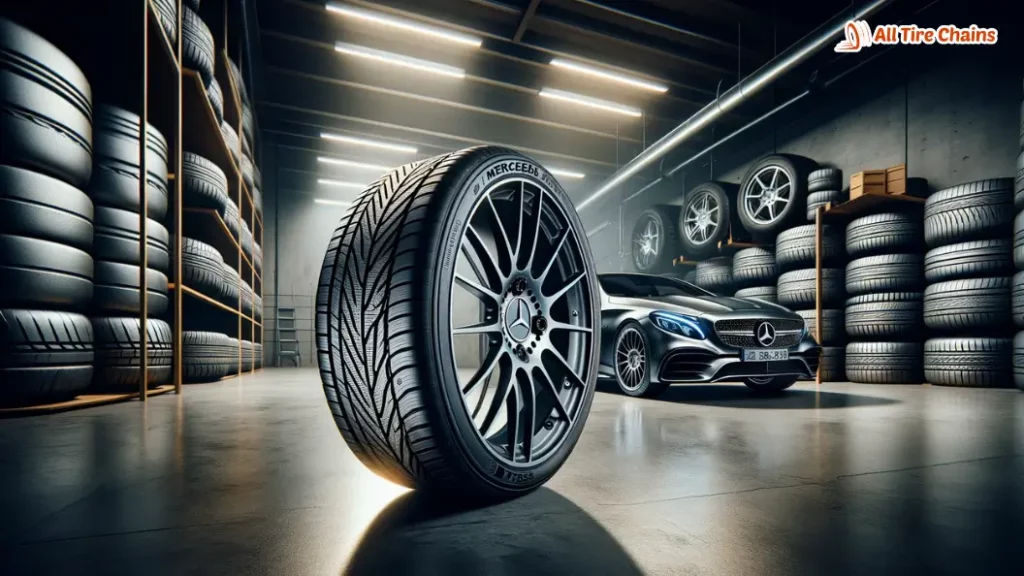
Another innovative option is run-flat tires, which allow for continued driving even after a puncture, adding an extra layer of safety and convenience.
| Tire Type | Description | Ideal Conditions |
|---|---|---|
| Summer Tires | Designed for optimal performance in warm weather; offer superior grip and handling on dry and wet roads. | Warm, dry, and wet conditions. |
| All-Season Tires | Versatile for moderate climates; provide decent traction in various weather conditions, including light snow. | Moderate climates, light snow. |
| Winter Tires | Essential for snowy and icy conditions; softer tread compound and deeper grooves for superior traction and grip. | Cold temperatures, snow, and ice. |
| Run-Flat Tires | Allow continued driving for a limited distance even with a puncture; provide increased safety and convenience. | Various conditions, emergency scenarios. |
Each type underscores the brand’s commitment to performance and versatility, ensuring the best tires for Mercedes are always in use.
Tire Brands Commonly Found on Mercedes Vehicles
Mercedes partners with top tire manufacturers to ensure optimal performance, with brands like Michelin, Pirelli, and Continental frequently featured. Each brand brings its unique strengths to the table. Michelin is celebrated for blending safety, comfort, and fuel efficiency, aligning perfectly with Mercedes’ values.
Pirelli, often chosen for Mercedes’s high-performance AMG models, excels in delivering tires that enhance the car’s dynamic abilities. Continental, meanwhile, is noted for its exceptional handling, especially under wet and winter conditions.
Additionally, Bridgestone makes its mark with a range of tires known for durability and reliability. This strategic collaboration ensures that what brand of tires does Mercedes use is always synonymous with quality, innovation, and peak performance, integral to the Mercedes driving experience.
| Tire Brand | Strengths | Commonly Used On |
|---|---|---|
| Michelin | Renowned for safety, comfort, and fuel efficiency. | General models for balanced performance. |
| Continental | Known for excellent handling, particularly in wet and winter conditions. | Models used in wet and winter conditions. |
| Pirelli | Popular for high-performance tires; often used on AMG models. | High-performance and AMG models. |
| Bridgestone | Offers a wide range; known for durability and reliability. | Various models requiring durability. |
You might also like: How Long Do Tires Last If Not Used? The Ultimate Guide
Factors Affecting Mercedes Tire Longevity
Mercedes tires are engineered to offer high-quality performance and durability. However, several factors can impact their lifespan. From the type of tire to the roads you travel, various elements impact how long your Mercedes tires will last. Understanding these factors is crucial for maximizing Mercedes tire longevity and ensuring your vehicle performs at its best.
Type of Tires and Treadwear Ratings
The type of tires and their treadwear ratings are pivotal factors in determining how long your Mercedes tires will last. Different tires are designed for varying purposes and conditions. High-performance tires may offer better grip but often have a shorter lifespan due to softer rubber compounds.
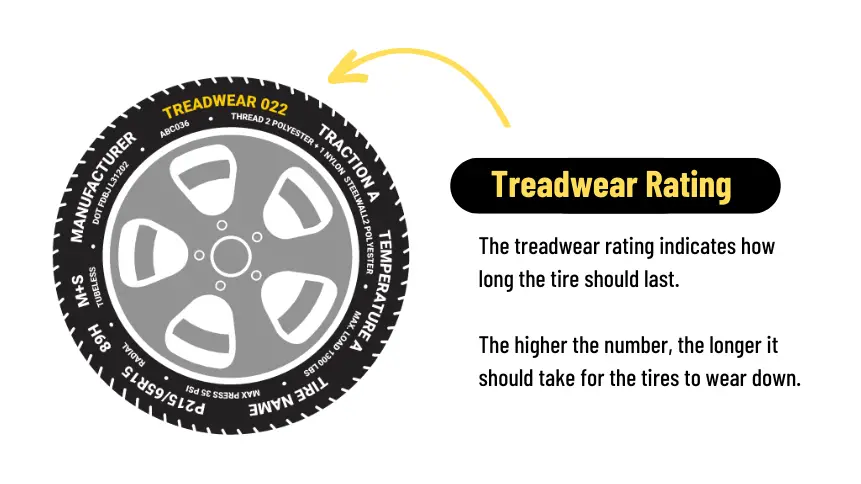
Treadwear ratings, provided by manufacturers, give an estimate of a tire’s longevity under standard conditions. These ratings are a key component in understanding the average life of Mercedes tires.
Driving Habits and Their Impact on Tire Wear
Driving habits, from acceleration to braking patterns, significantly influence the wear and tear of Mercedes tires. Aggressive driving, such as rapid acceleration and hard braking, can lead to faster tire wear.
Conversely, smoother driving habits can extend tire life. This aspect is a critical factor affecting the lifespan of Mercedes tires.
Maintenance and Care of Mercedes Tires
Consistent maintenance and proper care play a crucial role in maximizing the lifespan of tires on a Mercedes vehicle. Regular checks for proper inflation, alignment, and tire rotation are essential.
Neglecting these aspects can lead to uneven wear and reduced tire life. Proper maintenance is a decisive factor affecting Mercedes tire lifespan.
Environmental Factors and Tire Degradation
Environmental elements such as road conditions and weather patterns can accelerate tire degradation in Mercedes cars. Exposure to extreme temperatures, sunlight, and rough road surfaces can adversely affect tire integrity.

Understanding these environmental impacts is vital in answering ‘how long do tires on a Mercedes last’, as they can significantly shorten the expected lifespan of your tires.
By understanding the factors that affect Mercedes tire longevity, you can take proactive measures to protect their integrity and prolong their lifespan. Regular maintenance, safe driving habits, and investing in quality tires can all help you get the most out of your Mercedes tires.
Must check: How Long Can You Drive on Tires with Wire Showing? The Risk Revealed
Average Lifespan of Mercedes Tires
When it comes to the lifespan of Mercedes tires, several factors can affect their durability and longevity. According to industry experts, the average tire lifespan for Mercedes vehicles is about 40,000 to 60,000 miles, depending on the model and driving conditions.
Mercedes tires typically last 40,000 – 60,000 miles (64,000 – 96,000 kilometers), but can vary depending on factors like tire type (high-performance wear faster), driving habits (aggressive driving shortens lifespan), and proper care (regular rotations and pressure checks extend life).
High-performance tires wear faster, while all-season tires can reach 100,000kms. Regardless of mileage, replace tires every 6 years due to rubber aging. Check tread depth regularly – replace when it reaches 2/32″ for optimal safety.
It’s essential to note that the mileage expectations may vary based on factors such as driving habits, road conditions, weather, and tire quality. For instance, drivers who frequently travel on rough terrains or extreme weather conditions may experience tire wear at a faster rate than those who drive less frequently on smooth roads.
Additionally, the quality of the tires can affect their lifespan. Mercedes vehicles typically come with high-quality tires equipped with advanced features like run-flat technology and performance-enhancing treads, providing better durability and long-lasting tread life than regular tires.
| Factors Affecting Tire Lifespan | Explanation |
|---|---|
| Tire Maintenance | Proper tire maintenance practices, such as regular inspections and rotations, can significantly extend the tires’ lifespan |
| Driving Habits | Aggressive driving, overloading, and speeding can all cause unnecessary wear and tear on the tires |
| Road Conditions | Driving on rough roads or in extreme weather conditions can cause accelerated tread wear and affect tire durability |
| Tire Quality | The quality of the tires can significantly impact their lifespan, with high-quality tires typically having a longer tread life and better durability |
To gauge the longevity and lifespan of your own Mercedes tires, it’s crucial to monitor the tread wear and have them inspected regularly by a qualified technician. Keep in mind that even if your tires appear to have adequate tread remaining, they may still require replacement if they are several years old, as rubber compounds can degrade over time.
By understanding the average tire lifespan for Mercedes vehicles and the factors that can impact tire wear, you can take proactive measures to prolong their lifespan and ensure optimal safety and performance on the road.
You might also like: Can I Drive Long Distance with a Plugged Tire? Expert Advice
Essential Tips to Extend Mercedes Tire Life
To ensure your Mercedes tires last as long as possible, there are several maintenance practices you should follow. By implementing these tips, you can help maximize the lifespan of your Mercedes tires.
Regular Tire Rotations
Regular tire rotations are essential for even tire wear and extending the life of your Mercedes tires. It is recommended to rotate your tires every 5,000 miles to ensure optimal performance and longevity.
Proper Tire Inflation
Maintaining the correct tire pressure is crucial for optimal tire performance and longevity. Make sure to check your tire pressure regularly and inflate your Mercedes tires to the recommended pressure level listed in your owner’s manual or on the door jamb.
Alignment Checks
Wheel misalignment can put undue stress on your tires and affect their lifespan. It is essential to have your Mercedes’ alignment checked regularly to ensure proper alignment and reduce uneven tire wear.
Tread Depth Monitoring
Keeping an eye on your tire’s tread depth can provide valuable insight into their condition. Worn-out tires can compromise safety and performance. The minimum safe tread depth for Mercedes tires is 2/32″ (1.6 mm). You can easily check the tread depth using a tread depth gauge or by visually inspecting the tread patterns.
Long-Lasting Tire Options
Choosing the right tire type can have a significant impact on the lifespan of your Mercedes tires. Look for high-quality, long-lasting tire options explicitly designed for your Mercedes vehicle. Consult with a professional tire specialist to find the best options for your needs and driving style.
Mercedes Tire Replacement Frequency
As a responsible driver, knowing when to replace your Mercedes tires is essential for ensuring your safety on the road. It’s recommended to replace your worn-out tires before it becomes a safety issue that could lead to an accident.
The frequency of Mercedes tire replacement depends on various factors, such as driving habits, road conditions, and weather. On average, Mercedes tires are replaced every 3-4 years or after covering 40,000 miles. However, it’s crucial to inspect your tires regularly for wear and tear, punctures, bulges, and cracks.
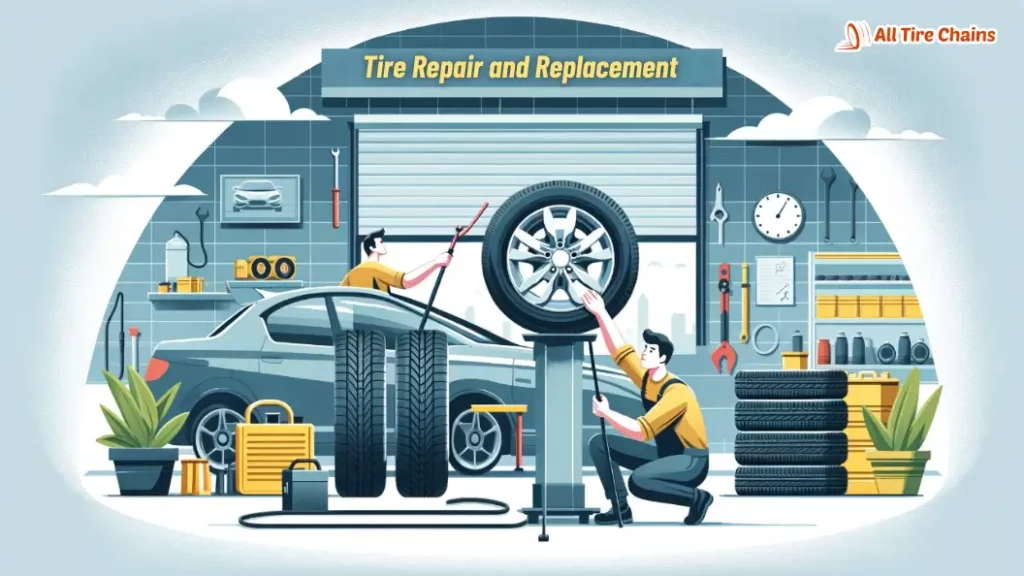
Indicators it’s Time to Replace Your Tires
| Signs of Worn Out Tires | Action Required |
|---|---|
| Low Tread Depth (below 2/32 inch) | Replace Tires Immediately |
| Uneven Tread Wear | Visit a Mechanic to Check Wheel Alignment or Tire Pressure |
| Bulges or Cracks on Tires | Replace Tires Immediately |
| Repeated Flat Tires | Replace Tires Immediately |
| Excessively Vibrating Tires | Visit a Mechanic to Check Wheel Balance and Alignment |
| Aged Tires (over 6 years) | Replace Tires Immediately |
Regular tire maintenance, such as proper tire inflation, rotating, and aligning, can help increase the lifespan of your Mercedes tires. Conduct tire inspections regularly, particularly before extended road trips or cold weather seasons. Stick to the recommended schedule provided by your manufacturer’s manual for replacing your Mercedes tires.
By following these suggested guidelines, you not only maintain the safety of yourself and others but also save yourself the expenses and inconveniences that come with driving around on worn-out tires.
You might also like: How Long Can You Drive on a Broken Tire Belt Safely?
Long-Lasting Tires for Mercedes
When it comes to choosing tires for your Mercedes, durability and performance are key. Some tire models have established a reputation for being long-lasting and reliable on Mercedes vehicles. Here are some things to consider when selecting long-lasting tires for your Mercedes:
- Choose a tire model that is compatible with your vehicle’s make and model
- Look for tires that are designed to handle the specific driving conditions you typically encounter, such as highway driving or wet roads
- Consider the tread life rating of the tire – this rating measures the expected lifespan of the tire
- Check for certifications such as the UTQG (Uniform Tire Quality Grade), which rates tires on various factors such as treadwear, traction, and temperature resistance
Below are some popular tire models among Mercedes owners:
| Tire Model | Main Features | |
|---|---|---|
| Michelin Pilot Sport A/S 3+ | 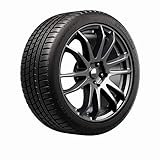 | Long tread life, excellent wet and dry grip |
| Continental PureContact LS |  | Smooth and quiet ride, good in all weather conditions |
| Bridgestone Potenza RE980AS |  | High-speed stability, long tread life |
While these are just a few examples, it’s important to do your research and choose the tire that best matches your driving habits and needs. Investing in quality, long-lasting tires will not only ensure better performance but also save you money in the long run.
Increasing the Lifespan of Mercedes Tires
Proper maintenance is vital for maximizing the lifespan of your Mercedes tires. However, there are additional steps you can take to enhance their longevity. Here are some strategies and techniques you can implement to increase the lifespan of your Mercedes tires:
- Proper tire storage: When storing your tires, keep them in a cool, dry place, away from direct sunlight. Avoid stacking or hanging them as this can deform the tires.
- Avoid aggressive driving: Aggressive driving habits, such as hard braking and acceleration, can accelerate tire wear and decrease the lifespan of your tires.
- Mindful tire load capacity: Overloading your vehicle or carrying items that exceed its weight limit can place excessive strain on your tires, leading to faster wear and tear. Be mindful of your vehicle’s load capacity to prevent premature tire damage.
By following these measures, you can significantly increase the lifespan of your Mercedes tires and enjoy optimal performance and safety on the road.
Must check: Can You Put 35 Inch Tires on 20 Inch Rims? A Comprehensive Guide
How Long Do Mercedes Tires Last Compared to Other Luxury Brands?
When comparing the longevity of Mercedes tires to those of other luxury brands like Audi, BMW, Lexus, Porsche, and Tesla, several key factors emerge. Typically, Mercedes tires last between 40,000 and 60,000 miles (64,000 – 96,000 kilometers), aligning them with other luxury brands.
This lifespan is influenced by the focus on performance tires, heavier vehicles, and sporty driving dynamics, which can lead to quicker wear. Proper care, however, can extend their life significantly, making them a reliable choice for Mercedes drivers.
Comparing Tire Life: Mercedes vs Other Luxury Cars
Now let’s find out how the longevity of Mercedes tires stacks up against those from Audi, BMW, Lexus, Porsche, and Tesla, revealing varied lifespans influenced by brand-specific factors.
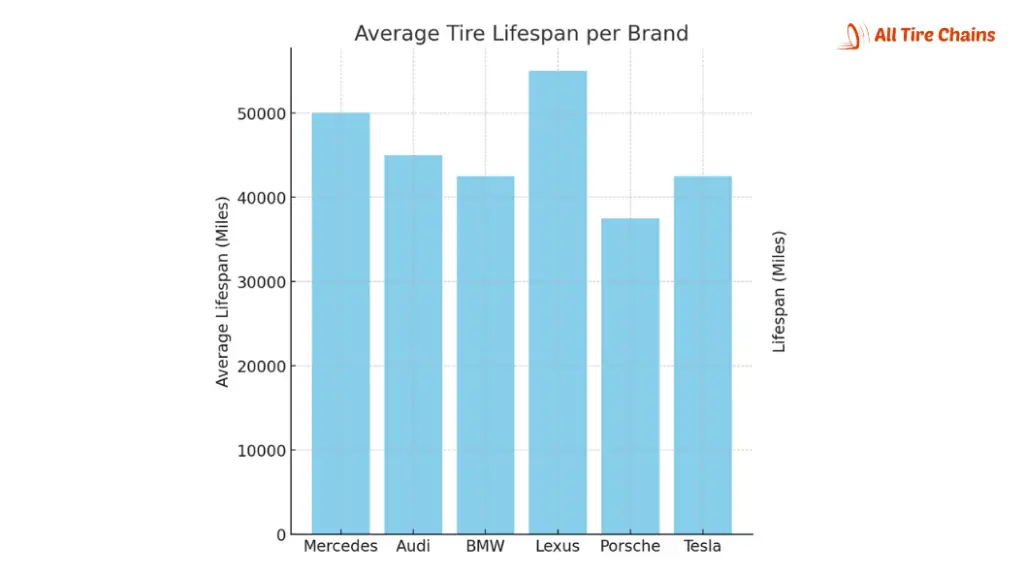
Audi
How long do Audi tires last compared to Mercedes? Audi’s tires, often touring or all-season types, generally last 35,000 – 55,000 miles (56,000 – 88,500 kilometers). Their slightly longer lifespan is a result of a balance between performance and durability.
However, like Mercedes, the lifespan can be shorter for performance-oriented models and aggressive driving habits. Audi’s focus on versatile tires contributes to their extended life, offering a slight edge over Mercedes in terms of durability.
BMW
How long do BMW tires last compared to Mercedes? BMW tires have an estimated lifespan of 35,000 – 50,000 miles (56,000 – 80,500 kilometers). This duration is slightly shorter than Mercedes, influenced similarly by sporty setups and driving styles.
While both brands emphasize performance, BMW’s focus on dynamic driving experience might contribute to a marginally quicker tire wear, placing them just below Mercedes in the luxury car tire longevity comparison.
Lexus
How long do Lexus tires last compared to Mercedes? Lexus tires outshine both Mercedes and BMW, with a lifespan of 45,000 – 65,000 miles (72,000 – 104,600 kilometers). This extended life is attributed to Lexus’s focus on comfort and all-season tires, which naturally endure longer than performance tires.
Their durability, combined with less aggressive driving dynamics, positions Lexus tires at the higher end of the longevity spectrum among luxury car brands.
Porsche
Porsche tires typically last between 30,000 to 45,000 miles (48,300 and 72,400 kilometers), the shortest among the compared brands. This reduced lifespan is due to their high-performance tires and the brand’s aggressive driving dynamics.
Porsche’s emphasis on sports performance significantly impacts tire wear, making them less durable than Mercedes and other luxury counterparts.
Tesla
How long do Tesla tires last compared to Mercedes? Tesla tires average a lifespan of 35,000 – 50,000 miles (56,000 – 80,500 kilometers). The heavier weight due to batteries and instant torque characteristic of electric vehicles accelerates tire wear, positioning them similarly to BMW in terms of tire longevity.
Tesla’s focus on electric performance thus influences their tires to have a comparable lifespan to Mercedes, albeit slightly shorter due to their unique vehicle dynamics.
Here’s a quick comparison of the average tire lifespan across different luxury car brands, along with key factors that influence their duration:
| Car Brand | Average Lifespan (Miles) | Factors Affecting Lifespan |
|---|---|---|
| Mercedes | 40,000 – 60,000 | Performance tires, heavier vehicles, sporty dynamics |
| Audi | 35,000 – 55,000 | Touring/all-season tires, performance models |
| BMW | 35,000 – 50,000 | Sporty setup, driving style |
| Lexus | 45,000 – 65,000 | Focus on comfort, all-season tires |
| Porsche | 30,000 – 45,000 | High-performance tires, aggressive driving |
| Tesla | 35,000 – 50,000 | Heavier weight, instant torque |
In comparing the tire life of Mercedes and other luxury cars, Lexus emerges with the longest lifespan, while Porsche has the shortest. Mercedes tires maintain a middle ground, balancing performance and durability effectively. The choice of tire type and driving habits significantly influence factors affecting luxury car tire life.
Tire Inspection and Maintenance
Regular tire inspection and maintenance are essential for extending the lifespan of your Mercedes tires. I will discuss the key areas to focus on for proper tire care and maintenance.
Tire Pressure Checks
One of the most critical tire maintenance practices is to check your tire pressure regularly. Improper pressure can lead to uneven wear, decreased gas mileage, and reduced tire life. Make sure to follow Mercedes’ recommended pressure levels for your specific vehicle.
Tread Wear Inspections
Regular tread wear inspections are also vital for maintaining tire performance and longevity. Inspect your tires for any cracks, punctures, or other damage. Additionally, keep an eye on the tread depth to ensure it hasn’t worn down beyond safe levels.
Tire Rotation Intervals
Tire rotation is another crucial maintenance practice that helps to distribute wear evenly across all four tires. Mercedes recommends rotating your tires every 5,000-7,500 miles, depending on your driving habits and vehicle model. Following these guidelines will help extend the lifespan of your tires.
Importance of Wheel Alignments
Wheel alignment affects tire longevity and performance, so it’s essential to have your alignment checked periodically. Signs that you need a wheel alignment include uneven tire wear, pulling to one side, or the steering wheel being off-center when driving straight. Keep in mind that driving over potholes or rough terrain can also affect your alignment.
| Tire Maintenance Practice | Recommended Frequency |
|---|---|
| Tire Pressure Checks | Monthly or before long trips |
| Tread Wear Inspections | Monthly or before long trips |
| Tire Rotation | Every 5,000-7,500 miles or as recommended by Mercedes |
| Wheel Alignment | Annually or as needed |
By following the recommended tire maintenance practices for your Mercedes, you can prolong the lifespan of your tires and ensure optimal safety and performance on the road.
You might also like: What to Do After Getting New Tires Installed: The Ultimate Checklist
Benefits of Regular Tire Rotation
Regular tire rotation is a crucial part of maintaining your Mercedes tires. When you rotate your tires, you are essentially moving them from one position to another, distributing wear more evenly across the tire treads. This helps extend the lifespan of your tires and improves overall performance on the road.
The Benefits of Tire Rotation
There are several benefits of regular tire rotation. Firstly, it promotes more even wear on your tires, which can prevent premature tread wear and extend the lifespan of your tires. Secondly, tire rotation can help improve handling and traction, providing better stability and control when driving. Finally, rotating your tires can also help save you money in the long run, as it prevents the need for premature tire replacement.
When to Rotate Your Tires
The recommended frequency for tire rotation varies depending on the make and model of your Mercedes, as well as your driving habits and road conditions. However, as a general rule of thumb, it is recommended to rotate your tires every 5,000 to 7,500 miles, or at least every six months. If you notice any irregularities in tire wear, such as bald spots or cupping, you may need to have your tires rotated more frequently.
How to Rotate Your Tires
Rotating your tires may seem like a complicated process, but it can be done easily with the proper tools and knowledge. The most common rotation pattern is the cross pattern, where the front left tire is moved to the back right position, the front right tire is moved to the back left position, and the two back tires are moved straight forward to the front. It is essential to follow the recommended rotation pattern for your specific Mercedes model, as outlined in the owner’s manual.
Regular tire rotation is an essential aspect of Mercedes tire maintenance. By rotating your tires every 5,000 to 7,500 miles, you can distribute wear more evenly, improve handling and traction, and extend the lifespan of your tires. Consult with your Mercedes dealer or trusted mechanic for specific recommendations on tire rotation for your model.
Importance of Proper Tire Inflation
Maintaining proper tire inflation is essential for ensuring safety and optimal performance on your Mercedes vehicle. Correct tire pressure plays a critical role in extending the lifespan of your tires and reducing the risk of accidents caused by blowouts, poor handling, and decreased fuel efficiency.
“Proper tire inflation is key to maximizing tire lifespan and safety on the road.”
Underinflated tires can wear unevenly, leading to a shorter lifespan and compromising handling on wet and slippery roads. Overinflation, on the other hand, reduces tire flexibility, causing uneven wear, and creating a rougher ride. Overinflated tires can also impact fuel efficiency; when tires are overly stiff, they move less and require more energy to roll, reducing gas mileage.
To ensure proper tire inflation on your Mercedes vehicle, use a reliable tire gauge and check your tire pressure regularly, at least once a month. Refer to your owner’s manual for recommended tire pressure levels, as they can vary depending on the make and model of your car.
For added convenience, some modern Mercedes vehicles are also equipped with a Tire Pressure Monitoring System (TPMS), which alerts you when your tire pressure drops under the recommended level, helping you stay on top of your tire maintenance game.
Apart from regular inflation checks, make sure your Mercedes tires are also rotated regularly and undergo alignment checks as recommended by your car’s manufacturer. These practices can help optimize tire lifespan and ensure safer, more comfortable driving experiences.
The Role of Wheel Alignment in Tire Longevity
Proper wheel alignment is essential for maximizing the lifespan of your Mercedes tires. Misaligned wheels can cause uneven wear on your tires, leading to premature tire replacement, decreased handling, and inferior ride comfort. Regular alignment checks and timely adjustments can help ensure optimal tire performance and longevity.
Importance of Proper Wheel Alignment
Wheel alignment refers to the adjustment of the suspension system that connects your car to its wheels. Proper alignment allows your vehicle to handle correctly and helps ensure your tires wear evenly. Misaligned wheels, on the other hand, can cause uneven tire wear and affect your car’s ride comfort and handling.
A misaligned wheel is usually noticeable by excessive tread wear on one side of the tire, uneven vehicle pulling to one side while driving straight, or vibration in your steering wheel. While some steering misalignment is normal during regular use, persistent symptoms may suggest a wheel alignment problem that needs professional attention.
Benefits of Timely Alignment Adjustments
Getting your wheels checked regularly and aligned as needed provides several advantages for Mercedes owners. Ensuring proper alignment reduces tire wear, provides better fuel economy, makes your car easier to handle, and improves overall ride comfort. Proper wheel alignments also improve the traction and overall performance of your car, providing a smoother and more enjoyable driving experience.
Must check: Will Les Schwab Mount Tires Bought Elsewhere? Understanding Policy
FAQs About the Average Lifespan of Mercedes Tires:
As a Mercedes owner, you want to ensure that your vehicle is performing at its best, particularly when it comes to tire longevity. Understanding how long do Mercedes tires last and when to replace Mercedes tires is essential for maintaining your car’s excellence. These frequently asked questions will provide insights into the average lifespan, maintenance, and replacement guidelines for Mercedes tires.
What is the average mileage I can expect from my Mercedes tires?
The expected mileage for Mercedes tires typically ranges between 40,000 and 60,000 miles. However, this can vary based on your driving style, the Mercedes model, and the type of tires used. High-performance models with sporty tires may wear down faster, while luxury sedans could see longer tire life. Additionally, factors like road conditions and maintenance play a significant role in tire longevity.
How often should Mercedes tires be replaced?
The Mercedes tire replacement frequency generally aligns with the tread wear. It’s recommended to replace Mercedes tires when the tread depth reaches 2/32nd of an inch. This could occur anywhere between 40,000 to 60,000 miles, but check your tires regularly (at least once a month) for wear and damage. Also, consider replacing them sooner if you frequently drive in harsh conditions or have an aggressive driving style.
Can the lifespan of Mercedes tires be extended through maintenance?
Absolutely, maintenance for Mercedes tires is crucial for extending their lifespan. Regular tire rotations every 5,000-7,500 miles can ensure even wear. Maintaining the recommended tire pressure and having periodic alignment checks are also vital. These practices help in preventing premature wear and extend the life of your tires, ensuring optimal performance and safety.
How often should I rotate Mercedes tires?
Mercedes tires should be rotated every 5,000-7,500 miles to promote even wear. This Mercedes tire rotation frequency is crucial for maintaining tire health and extending their lifespan. Check your owner’s manual for specific recommendations for your model. Regular tire rotation helps in distributing the wear evenly across all tires, preventing early replacements.
Does the type of Mercedes model affect tire longevity?
Yes, the type of Mercedes model can significantly impact Mercedes tire durability. High-performance models with low-profile tires tend to wear faster due to their sporty dynamics. Conversely, luxury sedans and heavier SUVs might see a more even and prolonged tire wear. Always consider your vehicle type when assessing tire life.
Are there specific tire brands that last longer on Mercedes vehicles?
Certain brands are known as long-lasting tires for Mercedes. OEM tires like Michelin, Pirelli, and Continental are tailored for Mercedes vehicles, offering optimal performance and wear. For high-performance models, Bridgestone Potenza or Yokohama Advan Sport are excellent choices for grip and durability. However, budget-friendly options like Hankook or Falken may not provide the same longevity as premium brands.
What are the signs that my Mercedes tires need immediate replacement?
Signs for replacement time for Mercedes tires include a tread depth of less than 2/32nd of an inch, visible bulges or cracks in the tire, excessive vibration at higher speeds, and consistently low tire pressure. These indicators suggest your tires are no longer safe and require immediate replacement.
How much do Mercedes tires cost?
The cost of Mercedes tires varies based on the model and tire type. Standard tires for common models typically range from $200-$400 per tire. High-performance tires can cost between $400-$800, while run-flat tires may range from $300-$1000 per tire. Prices may differ based on location and dealer.
Are there any warranties on Mercedes tires?
Most tire brands offer extended warranties for Mercedes tires. These warranties cover defects and treadwear for a specified period. Additionally, some retailers provide road hazard warranties for added protection against punctures or other damages. Always check the specific warranty details when purchasing new tires.
Final Verdict: How Long Do Tires on a Mercedes Last?
The longevity of Mercedes tires is influenced by a combination of factors, including the model, driving style, road conditions, and maintenance. The average life of Mercedes car tires typically ranges from 40,000 to 60,000 miles, showcasing a blend of performance and endurance. However, how long do Mercedes tires last with proper maintenance can vary.
For instance, high-performance models may experience faster wear due to their sporty nature, while luxury sedans often benefit from longer tire life.
On average, Mercedes tires last between 40,000 to 60,000 miles. Factors like vehicle model, driving style, and tire maintenance play a crucial role. Proper care, including regular rotations and pressure checks, can extend this lifespan. High-performance models may see quicker wear, while luxury sedans often enjoy greater longevity. Always check tread depth and replace tires when necessary for safety and optimal performance.
The average lifespan of mercedes tires is a testament to their quality and the engineering behind them. Emphasizing Mercedes tire longevity, these figures remind owners that with attentive care, their tires can provide extended service and reliability.
Ultimately, understanding these aspects helps Mercedes owners ensure that their vehicle remains a paragon of luxury and performance, keeping them safe and satisfied on the road. This conclusive insight into tire lifespan not only enhances your Mercedes driving experience but also underscores the importance of regular maintenance and mindful driving habits.
You’ll likely appreciate diving into: